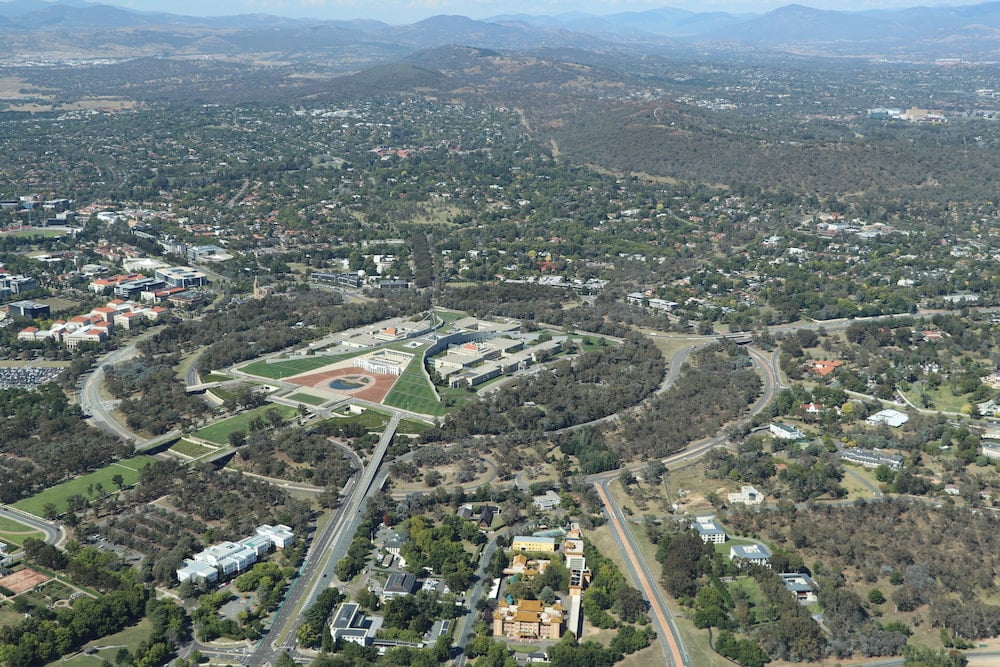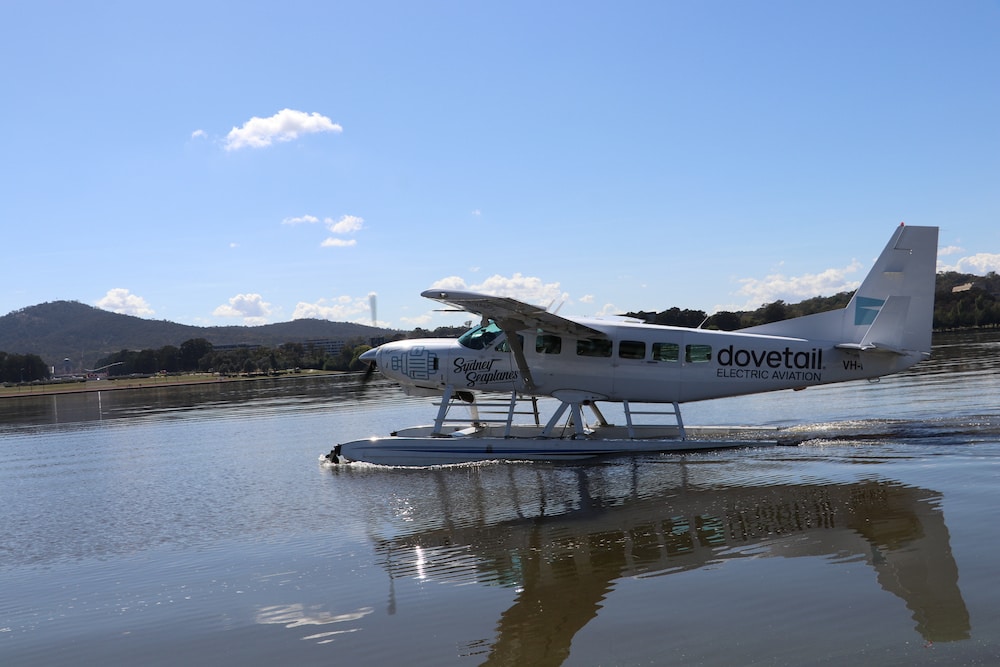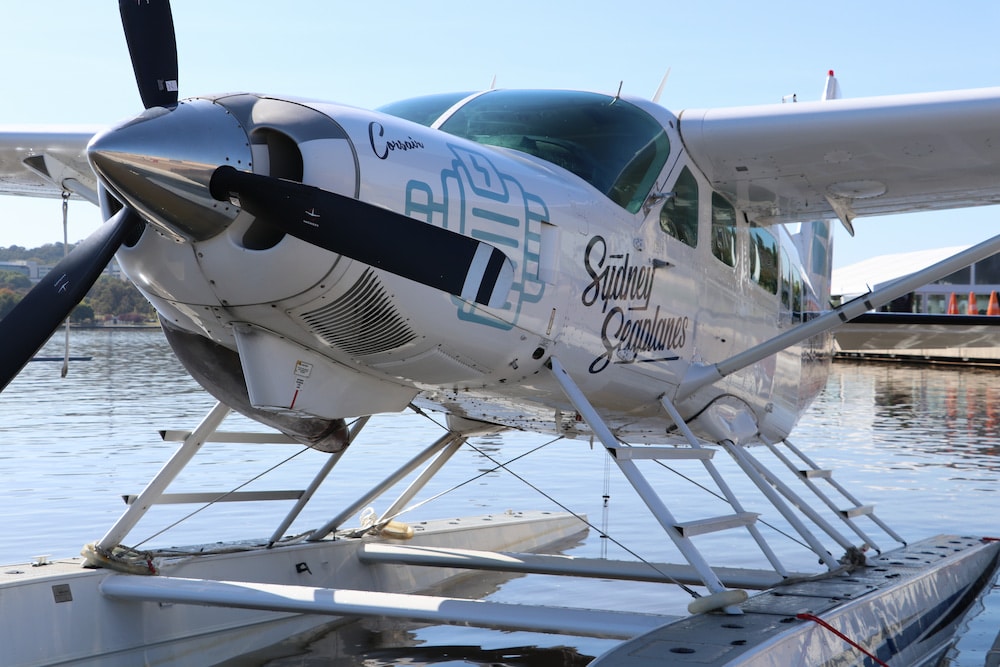Seaplanes are expected to begin flying between Canberra and Sydney or the NSW South Coast by spring, and operators confidently predict that this journey will be one of the world’s great commuter flights.
Until Sunday, seaplanes will trial take-offs and landings on Lake Burley Griffin’s West Lake, West Basin, and Central Basin, so pilots can familiarise themselves with the waterway before commercial operations begin.
The National Capital Authority (NCA) has designated West Basin as the site for commercial operations – the seaplanes will use a floating pontoon at the eastern side of the National Museum of Australia.
The trial is also using Central Basin as a backup area to land on in case there is a large yachting regatta on West Lake.
Lake user groups (including the Canberra Yacht Club) requested the trial flights in January.
“Hopefully, this week will let all the community see what it’s all about,” Sally Barnes, CEO of the NCA, said. “Once you see it, it’s quite disarming as to how little impact, how little noise, and how interesting it is.”
Sydney Seaplanes, the largest operator in Australia, is flying six to 10 trials from Tuesday 14 March, to Thursday 16 March, between 9am and 4pm.
They intend to run a twice-daily commuter service between Rose Bay in Sydney and Lake Burley Griffin, landing in Canberra at 10am and 3.30pm, and departing at 10.30am and 4pm (suitable for tourists). They will also fly between Canberra Airport and Sydney Harbour (mornings and evenings), for business.
Their Cessna Caravan will carry nine passengers, and fly at up to 10,000 feet, above most turbulence. Passengers can carry up to 10 kg of luggage per person. Their proposed route is to fly from Canberra to Wollongong, and then up to the coast to Sydney Harbour.

“We’re creating one of the world’s most spectacular commuter services, where you’ve got Australia’s Parliament at one end and Sydney Opera House and Harbour Bridge at the other,” Aaron Shaw, Sydney Seaplanes CEO, said. “That’s going to be a very attractive proposition.”
South Coast Seaplanes will operate scenic flights around Canberra. Their trial flights will be held over this weekend, Saturday and Sunday 18-19 March, from 9am to 4pm.
Ms Barnes expects the seaplane flights will be on bucket lists. “It really is a bonus for tourism … and it puts us on the map as one of the best flights in the world.”
- New safety guide for seaplanes and other Lake Burley Griffin users (15 November 2022)
- Seaplanes to Sydney and the South Coast (22 December 2021)
- Sydney to Canberra seaplanes a step closer (17 December 2021)
- Harbour-to-lake seaplane commute may be possible next year (15 December 2020)
The best places around the Lake to see the trial flights are Commonwealth Place, Regatta Point, Acton Peninsula, and the National Museum of Australia jetty.
The NCA has offered trial flights to lake user groups, stakeholders, and individuals. Anyone who wants to go up in a plane should contact the NCA at: [email protected].
“We’ll see if we can get you on a flight,” Ms Barnes said.
The public should continue to use the lake as normal during the trial flights. The NCA states that the trials aim to ensure the safety and shared use of the lake, including no disruption to lake users and activities.
“Our intention is that other users of the lake do not need to change anything they currently do,” Mr Shaw said.
Seaplanes are two hours faster and more convenient than normal planes, Mr Shaw believes. It takes one hour to fly from Lake Burley Griffin to Rose Bay, and another 15 minutes to catch a ferry to Circular Quay.
“They are by far the fastest way of connecting the centre of both cities,” Mr Shaw said.
Prices will be similar to, or cheaper than, commercial flights.
Approximately 1,500 people fly from Canberra to Sydney each day, and 11 million passengers every year.
“Currently, only about 1 million of those are flying,” Mr Shaw said. “There’s a great commercial opportunity, particularly given the time savings services will offer.”
Eventually, he envisages, seaplanes will connect Canberra and Sydney to Newcastle and the central and south coasts.
Seaplanes are supported by the ACT Government and the Canberra Region Tourism Leaders’ Forum, but some residents (like the Lake Burley Griffin Guardians) oppose them, arguing that they will be dangerous, pollute the lake, and interfere with lake-based activities.
Under maritime legislation, seaplanes give way to all other marine traffic, Mr Shaw said. Sydney Seaplanes operates on the “very busy” Sydney Harbour, while Rose Bay is the same size as West Lake. It has 60 ferry services, pleasure craft, and sailing schools.
“We’re used to operating in that kind of environment,” Mr Shaw said.
A lake users’ guide will provide guidance on governing regulations; permitted and prohibited activities; new legislation; seaplane operations; requirements for boats; boat and mooring permits, agreements, and approvals.

Nor will the seaplanes damage the environment, Mr Shaw argued. Sydney Seaplanes is part of Dovetail Electric Aviation, which retrofits aircraft with electric engines, driven by batteries or hydrogen cells. These motors produce no emissions in flight, and are quieter, Mr Shaw said. He hopes that all flights will be electrical within the next decade.
“These planes are the right size for this sort of technology to begin on,” Mr Shaw said. “It’s almost a responsibility of ours that we play a part in this transition.”
Seaplanes will not pollute the lake, he said; they do not use any pollutants. While fuel-burning engines produce emissions, the seaplanes produce no wake from take-off or landing; and no antifoul paint or toxic chemicals are applied.
“As a result,” Mr Shaw said, “seaplanes can operate in environmentally sensitive areas all over the world.”
Independent environmental and heritage experts will assess the seaplanes’ operations: noise, wakes, impacts on wildlife, Ms Barnes said. The NCA will look at the results, then progress to a licence and the lake user guide.
“While the NCA supports the introduction of seaplanes to diversify the activities that people can enjoy on the lake, we will be guided foremost by the principles of safety and least disruption to lake users,” Ms Barnes said last month.
“Seaplanes will only commence operations once we have sufficiently considered the input of the community and stakeholders as well as the environment and heritage consultants.
“Once operations commence, the NCA will regularly review and fine-tune details in consultation with lake users and make adjustments, if necessary.”



